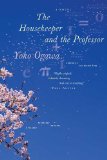Summary | Excerpt | Reading Guide | Reviews | Beyond the book | Read-Alikes | Genres & Themes | Author Bio

A Novel
by Yoko OgawaUpon meeting the tenth
housekeeper hired to care for him, the
Professor launches into a math lesson on
magical numbers, focusing on the special
prime numbers. Rather than being annoyed or
intimidated like the others, the Housekeeper
becomes intrigued, determined to make the
relationship work. She draws the Professor
out, asking him to explain his ideas, and he
blossoms further when her young son begins
to visit with him after school. Since the
Professor's memory constantly dissolves, the
introductions begin anew every morning and
each day is an opportunity to create a new
relationship.
The title characters are known to the reader
only by their professions, and the symbolic
anonymity adds to the fable-like feel of the
story. The Housekeeper's ten-year-old son is
known as Root – so named by the Professor
because of the shape of the boy's head and
hair reminds him of the
square root symbol. Root's name is
further symbolic; he is clearly the anchor
and sustaining force in his mother's life.
As the Professor and Root spend more time
together, they discover a common passion:
baseball. Root avidly follows the Tigers, a
major league team, and the Professor is a
fan of Enatsu, the team's star player from
twenty years ago. The Housekeeper convinces
the Professor to join her and Root at a
game, and although he has a fear of crowds,
and still believes Enatsu is playing, the
three bond over the game. Slowly, the
unlikely trio becomes a wonderfully unusual
family. Even though the Professor cannot
remember that he has met Root before, his
growing love for the boy doesn't disappear
with his memories – it takes up residence
deep in his heart and changes him.
The Professor's math lessons achieve what
only the very best math teachers can: he
makes math seem beautiful, almost magical.
As he describes his passion to the
Housekeeper, "The mathematical order is
beautiful precisely because it has no effect
on the real world. Life isn't going to be
easier, nor is anyone going to make a
fortune, just because they know something
about prime numbers."
Yoko Ogawa's writing is delicate and poetic,
describing sounds you can almost hear:
the gentle patter of the rain was punctuated
by the scratching of pencil on paper, or
crafting metaphors that drive to the heart
of abstract emotions: the image I have of
my father is that of a statue in a museum.
No matter how close I come to him, I can't
get his attention, he continues to stare off
into the distance without looking down, and
never reaches out his hand to me.
Ogawa's fine prose and enchanting characters
easily wind their way into your heart as
their simple story unfolds to give voice to
complex ideas about math, love, family and
memory. The Housekeeper and the Professor
will make you smile, and leave you pondering
its meaning long after you have finished it.
![]() This review
first ran in the February 5, 2009
issue of BookBrowse Recommends.
This review
first ran in the February 5, 2009
issue of BookBrowse Recommends.

If you liked The Housekeeper and the Professor, try these:

by Ethan Canin
Published 2016
In this mesmerizing novel, Ethan Canin, the New York Times bestselling author of America America and other acclaimed works of fiction, explores the nature of genius, jealousy, ambition, and love in several generations of a gifted family.

by Alice LaPlante
Published 2012
A stunning first novel, both literary and thriller, about a retired surgeon with dementia who clings to bits of reality through anger, frustration, shame and unspeakable loss.
Your guide toexceptional books
BookBrowse seeks out and recommends the best in contemporary fiction and nonfiction—books that not only engage and entertain but also deepen our understanding of ourselves and the world around us.